For 13 years, Dirk Garos has been active with Restrain to use ethylene to prevent germination in potatoes. Now that Chlorpropham (CIPC) is about to be banned, the company is dedicated to a large-scale introduction of ethylene to keep chips varieties free from germination throughout the season. On Tuesday 23 April, representatives of international chips factories, the Dutch Potato Organisation and the trade press were present at PPO in Westmaas, the Netherlands, for the kick-off of the method, which, incidentally, is already used to treat one million tonnes of potatoes by means of 1,300 – fifth generation – generators.
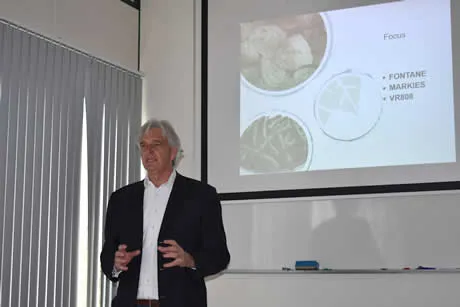
Presentation Dirk Garos
The project to use ethylene in potato storage was started in 1999 by British table potato giant Greenvale, when studies showed that ethylene was a possible solution to prevent germination. This project mostly came from demand from buyer Tesco to offer a residue-free product. Under the guidance of Dirk Garos, the method is now used in 36 different countries. Tests by PPO in recent years showed that besides anti-germination, it also results in a positive effect on the frying quality of the chips potatoes, and the Fontane, Markies and VR808 varieties in particular show positive peaks. “These varieties therefore have our focus. Other varieties also show good results, but these varieties we trust enough to blindly use our generators for. These varieties have a considerable share on the market and are an ideal starting point for us. That’s more important for us than being dedicated to varieties like Bintje, which haven’t shown the benefits.”
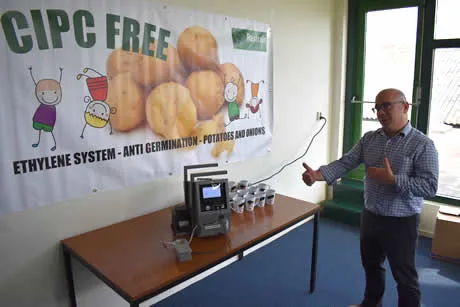
Paul O’Connor demonstrates the latest generator
Dirk started by explaining the effects of ethylene, which don’t start until the potatoes have been stored. To prevent safety risks, they don’t work with gas cylinders. Ethylene gas is produced from a low dose of ethanol by means of a catalyst. The ethylene gas is stored in the potato for a little while, after which the gas is released so that fission continues as normal. “That’s the main difference with chemicals such as CIPC, which blocks the cel division in the sprout , while ethylene blocks the cel elongation in the sprout. The effects of the ethylene start when the potatoes reach the right storage temperature, and the applying is gradually built up over the first three weeks, after those three weeks, a constant flow is applied.”
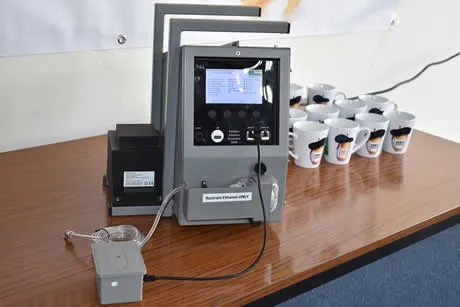
The latest generator is supplied with a CO2 sensor, temperature and atmospheric humidity meter. Within six months it should also be possible for data to be send from the generator to the cloud, so that the data can also be consulted on smart phones. According to Dirk, installation is a matter of plug-and-play. “You’ll be ready for the season in five minutes.” No further requirements are made to the storage, and one machine has the capacity to provide all potatoes in storage with ethylene, because the machine’s capacity is nearly 6,000 tonnes. “Ethylene is a dynamic gas that reaches everywhere. Each potato in storage has ethylene applied to it, you can be certain of that,” Dirk told those present.
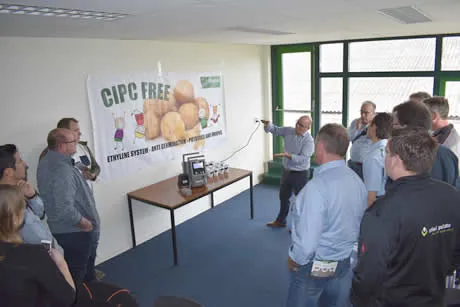
High levels of interest from the chips industry
An additional advantage is that the potatoes are suitable for processing in plants straight from storage, which provides flexibility in scheduling. “But above all, we can provide a solution to consumers’ desire for residue-free products. On market such as Scandinavia and France, this has been a requirement in retail for a while now. Now that the use of CIPC is also about to be allowed in the rest of Europe, we want to introduce ethylene on a large scale. We see ourselves as disrupters. Ethylene is coming. Today is the kick-off to enter the market for the 2019/2020 season. Price shouldn’t be a problem; we’re four to six times cheaper than every other alternative to CIPC,” Dirk concludes.
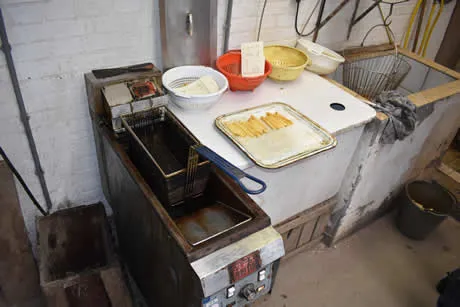
The latest fry-colour test of PPO Westmaas’ storage trial
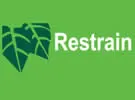 For more information:
For more information:
Dirk Garos
Restrain Company Ltd
Mob. +31 6 53 86 92 21
Dirk.Garos@restrain.eu.com
www.restrain.eu.com
